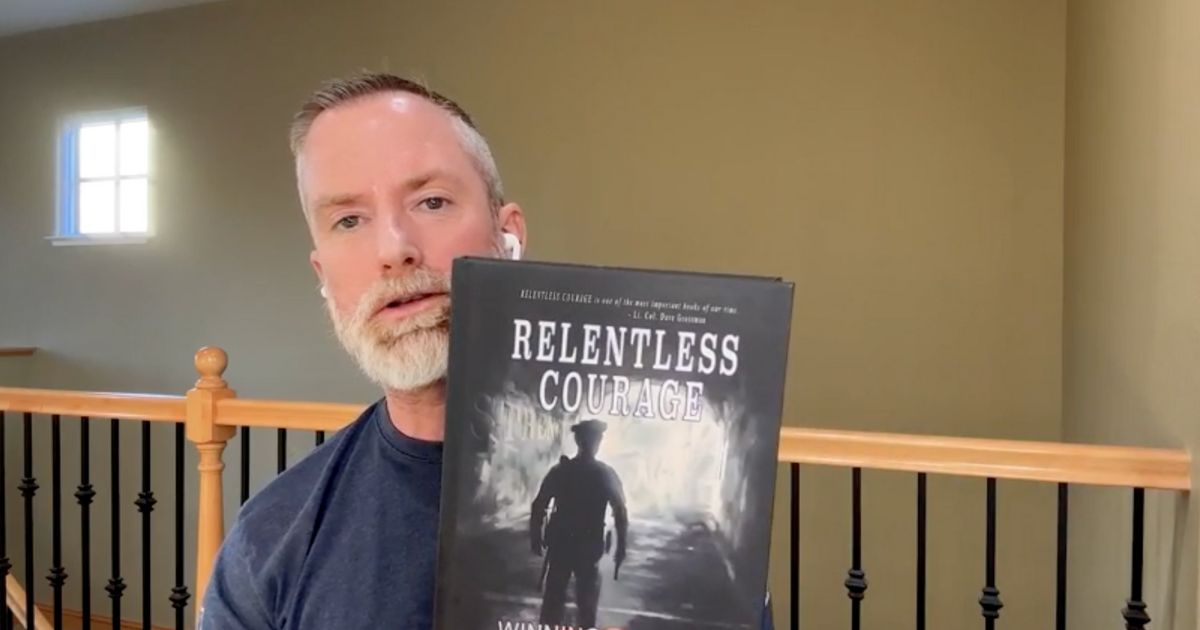
Relentless Courage is not just a book about a police officer’s story in the line of duty but a testament to the struggles and challenges officers face.
Life serving the country and defending innocents can become very traumatic in the long run; that’s why Michael Sugrue talks about the importance of asking for help and going to therapy.
In this episode of the Veteran Led Podcast, Michael shares his story battling PTSD after a traumatic event as a police officer, his time in the Air Force, and his lessons in leadership.
It was under his stepfather’s guidance that Michael chose to become a police officer, driven by a noble aspiration to serve and assist others.
Michael joined the Air Force and was commissioned as an officer in the Security Forces.
His military career was marked by success and smooth progression; he even became part of a specially trained unit: Phoenix-Ravens.
Michael eventually left the Air Force to pursue a life as a police officer in the civilian world.
However, during this period of his life, things took a drastic turn and changed his life forever.
On his second day on patrol as a new sergeant on the graveyard shift, he received a distress call that found nothing but alarming.
The desperate voice on the other end reported a woman trapped inside a condo and being threatened by a man.
Racing against time, Michael arrived at the scene, not knowing exactly what to expect.
The sight that met him was one of terrifying chaos. Inside the condo, a couple was hiding from a man armed with a knife who was frantically trying to enter their home and stabbing the door repeatedly.
The man stopped for a moment. Blankingly stared at Michael and the other officers at the bottom of the stairwell. Then the man went to attack the officers.
Faced with this situation, Michael had to make a thought but quick decision. With the innocent couple in mind, he decided to neutralize the threat.
The outcome was tragic yet necessary; they had to take the life of the man to ensure the survival of the innocent and his team on the scene.
The impact of this event was not as he would have expected; days led into months, months led into years, people were cold to him, and he was treated as a suspect.
There were a lot of times in his life when Micheal had other near-death experiences.
Yet, it was this particular incident that made his life harder, turning his life unbearable and his dreams into nightmares.
In the aftermath of this event, he found himself isolated, with no support system to help him navigate this time.
The silence around him was deafening, amplifying the echoes of his internal turmoil. His only confidants were his lawyers, a professional relationship that offered little comfort.
This lack of personal connection left him feeling hollow, trapped in a cycle of depression and desolation.
It was during this dark period that he made a life-altering decision – to reach out and ask for help.
He had come to a point where his trauma became too overwhelming to bear alone. He realized that sometimes, the strongest thing one can do is to acknowledge their vulnerability.
Understanding the importance of mental health and therapy, he started searching for a professional who could guide him through his depression.
He had begun to comprehend that therapy wasn’t just about discussing problems; it was a journey toward understanding oneself, gaining coping mechanisms, and healing.
In many ways, Micheal believed that asking for help required more courage than anything else. It requires you to face your deepest fears and insecurities and work to make them manageable.
Despite encountering resistance from his team and superiors, who just told him to take some days off and that therapy wasn’t necessary, he moved on with his sessions.
Making his mental health a priority was not an easy task, but it’s what changed his life for good.
After enduring years of living with the trauma, he found the motivation to transform his experiences into a powerful narrative.
His book, ‘Relentless Courage”, serves as a beacon of hope for those grappling with similar struggles he went through.
At the heart of his motivation was the desire to provide a better future for his daughter. He wanted to be a good and present father for her, demonstrating how one can rise from adversity.
In ‘Relentless Courage”, he emphasizes the importance of mental stability and resilience for effective leadership.
Leaders need to cultivate a strong, healthy mind to guide others effectively. This involves taking time for self-care and building meaningful, healthy relationships.
A significant aspect of the book is also dedicated to the discussion on Post-Traumatic Stress Disorder (PTSD) and suicide.
He underscores the need to acknowledge these issues, opening up dialogue and promoting understanding.
Effective leadership extends beyond strategic decision-making and task delegation. A truly good leader is one who genuinely cares about the mental well-being of their team.
They understand that a healthy, positive work environment contributes significantly to productivity, happiness, and well-being.
A leader who dismisses the importance of mental health can be detrimental to the team. Ignoring the reality of conditions such as Post-Traumatic Stress Disorder (PTSD) can lead to a toxic work environment marked by misunderstanding and stigmatization.
Good leadership entails being present and attentive to the team’s mental health needs. It involves creating an environment where everyone feels safe, valued, and supported.
Tune in to the Veteran Led Podcast to learn more powerful and inspiring stories for veterans and how they keep improving and contributing to our community.
Our monthly newsletter features about important and up-to-date veterans' law news, keeping you informed about the changes that matter.